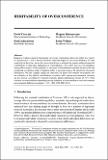Heritability of Overconfidence
Author(s)
Cesarini, David Alexander; Johannesson, Magnus; Lichtenstein, Paul; Wallance, Bjorn
DownloadCesarini-2009-HERITABILITY OF OVERCONFIDENCE.pdf (319.4Kb)
PUBLISHER_POLICY
Publisher Policy
Article is made available in accordance with the publisher's policy and may be subject to US copyright law. Please refer to the publisher's site for terms of use.
Terms of use
Metadata
Show full item recordAbstract
Empirical evidence suggests that people on average overestimate their own ability in a variety of circumstances. Little is known, however, about the origins of such overconfidence. To shed some light on this issue, we use the classic twin design to estimate the genetic and environmental contributions to individual differences in overconfidence. We collect data on overconfidence among 460 twin pairs. Overconfidence is measured as the difference between the perceived and actual rank in cognitive ability. Cognitive ability is measured using a 20-minute test of general intelligence. We find a highly significant joint effect of genes and common environment, but our estimates of the relative contributions of genetic and common environmental variation are less precise. According to our point estimates, genetic differences explain 16–34% of the variation in overconfidence depending on the definition of overconfidence used and common environmental differences explain 5–11%.
Date issued
2009-04Department
Massachusetts Institute of Technology. Department of EconomicsJournal
Journal of the European Economic Association
Publisher
MIT Press
Citation
Cesarini, David et al. “Heritability of Overconfidence.” Journal of the European Economic Association 7.2-3 (2009): 617-627. © 2009 by the European Economic Association
Version: Final published version
ISSN
1542-4766
1542-4774